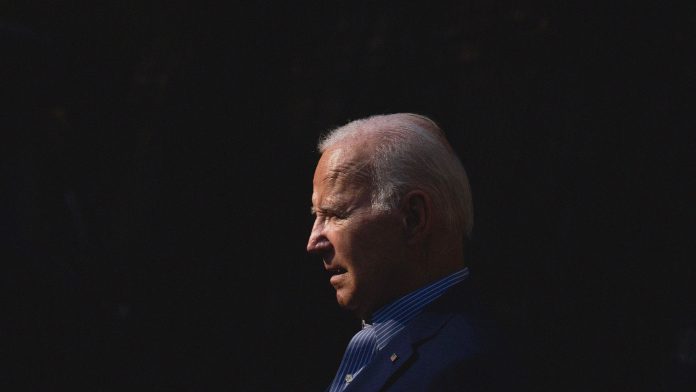Sign up for The Decision, a newsletter featuring our 2024 election coverage.
We were reminded yet again this past weekend that Joe Biden might be in deep electoral trouble. Once again, hands were wrung.
This latest bout of alarm was occasioned by a New York Times/Siena College poll showing that only 23 percent of Democratic-primary voters said they are enthusiastic about President Biden’s candidacy. Forty-five percent said Biden should not be the party’s nominee. And Donald Trump led by five points in a head-to-head matchup.
Yes, voters overwhelmingly believe that Biden is too old to be running for another term. He looks old, walks old, and seems not as sharp as he once was. This is not a new story. The premise has been challenged vigorously by the White House—to no avail.
But there might be more to voters’ acrimony toward Biden than just his age. In speaking with Democrats about the president’s reelection chances, I often pick up a sharp tone that goes beyond resignation. It sounds more like rage.
Senior citizens are not unpopular, per se. Biden himself was relatively well liked into his 70s, even among those who were not eager to vote for him. Some Democrats might have preferred Barack Obama or Bernie Sanders in past elections, but Biden still inspired a certain fondness.
[Helen Lewis: Biden’s age is now unavoidable]
Democrats were grateful that he was willing to run against, and able to defeat, Trump in 2020. It’s not at all clear that the likes of Sanders, Elizabeth Warren, or Pete Buttigieg could have pulled that off. Many voters appreciated the relative normalcy Biden brought to the White House after the bedlam of Trump. This gratitude was reflected in the sturdy approval ratings Biden received in the first six months of his term.
But those numbers have since plummeted. From the high 50s (in early 2021) to the low 40s (in much of 2022 and 2023) to the 30s (36 percent in the Times/Siena poll). Biden’s team has expressed bewilderment over this decline, which has coincided with an improved economy. Many pollsters pin the reversal on the bloody U.S. withdrawal from Afghanistan in August 2021. But that does not account for Biden’s steadily falling fortunes long afterward.
As a general rule, voters tend not to appreciate late-career politicians when they’re trying to stick around. Hillary Clinton was among the most admired leaders in America when she left her post as secretary of state, in early 2013. That esteem eroded considerably when she started seeking a promotion in 2015. Perhaps Biden’s turnabout owes to a similar phenomenon: Voters preferred his presidency as a farewell tour more than an endurance run.
Even many of Biden’s biggest defenders say privately that they didn’t expect him to run again. Biden himself suggested as much. “Look, I view myself as a bridge, not as anything else,” Biden said at a March 2020 campaign rally in Detroit. He called himself a “transition candidate.” Sarah Longwell, the Bulwark publisher who has conducted focus groups across the political spectrum, told me last September: “It seems pretty implicit in the way voters talk that they didn’t expect him to be a two-term president.”
[Read: So much for Biden the bridge president]
I’m struck when I speak with exasperated Biden voters by how often they bring up the “bridge” quote and the “transition candidate” line. This suggests that they viewed their past support for Biden as an emergency proposition—and that his ongoing presence violates an implied bargain. Sure, politicians are always trying to keep their options open. But you can understand how voters might feel bait-and-switched by Biden’s refusal to go away.
It’s easy to sympathize with an old-timer reluctant to give up something he loves. In Biden’s case, though, the stakes are potentially catastrophic. By running again—despite his age, despite his low approval ratings, despite his poor showing in the polls against Trump—Biden could be engaging in one of the most selfish, hubristic, and potentially destructive acts ever undertaken by an American president. If he winds up losing, that’s all anyone will remember him for. Bill Maher has said Biden could go down as the “Ruth Bader Ginsburg of the presidency.” Or of democracy.
Large majorities of Americans don’t want to see Trump back in the White House. Many are terrified at the prospect—with extremely good reason. Biden has put them in an incredibly dangerous position. But the more unpopular Biden becomes, the more stubborn he appears.
[Jonathan V. Last: Biden is still the Democrats’ best bet for November]
Many of Biden’s defenders say it’s too late to do anything about this predicament. “Democrats are increasingly getting very, very vocal in their defense of Biden,” the Brookings Institution’s Elaine Kamarck, a member of the Democratic National Committee, told The New York Times recently. “The guy’s a good guy. He’s not senile. He’s made good choices. The economy’s the best economy in the world. I mean, shut up. Let’s get behind this guy.”
I’m no political-messaging expert, but the shut-up-and-get-behind-this-guy approach seems a tad off-putting. Maybe it is too late to do anything. Or is it, really? The persistence of the question signals an enduring market for a better option. At the very least, voters seem less than thrilled with this situation. A lot of them blame Biden for it.
The plane has taken off. It is clearly sputtering. The pilot is not saying much. When he does, he sounds shaky. He is not inspiring confidence. A solid majority of passengers would much rather someone else were at the controls. They have voiced this concern repeatedly. (For the record, the Federal Aviation Administration’s compulsory retirement age for commercial pilots is 65.)
But the flight attendants keep telling us it’s too late. The plane’s already in the air. And this is the only captain we have available. Trust us, in private he’s in peak form. He’s not senile.
Please remain seated, and keep your seat belts fastened.

















